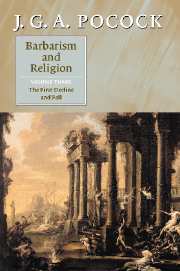Book contents
- Frontmatter
- Contents
- Acknowledgements
- Note on usages
- List of abbreviations
- Introduction
- PROLOGUE
- 1 Gibbon's first volume: the problem of the Antonine moment
- PART I THE FIRST DECLINE AND FALL: ANCIENT PERCEPTIONS
- PART II THE AMBIVALENCE AND SURVIVAL OF CHRISTIAN EMPIRE
- 5 Orosius and Augustine: the formation of a Christian anti-history
- 6 Otto of Freising and the two cities
- 7 The historiography of the translatio imperii
- PART III THE HUMANIST CONSTRUCTION OF DECLINE AND FALL
- PART IV EXTENSIVE MONARCHY AND ROMAN HISTORY
- PART V REPUBLIC AND EMPIRE: THE ENLIGHTENED NARRATIVE
- PART VI GIBBON AND THE STRUCTURE OF DECLINE
- EPILOGUE
- Bibliography of works cited
- Index
7 - The historiography of the translatio imperii
Published online by Cambridge University Press: 15 December 2009
- Frontmatter
- Contents
- Acknowledgements
- Note on usages
- List of abbreviations
- Introduction
- PROLOGUE
- 1 Gibbon's first volume: the problem of the Antonine moment
- PART I THE FIRST DECLINE AND FALL: ANCIENT PERCEPTIONS
- PART II THE AMBIVALENCE AND SURVIVAL OF CHRISTIAN EMPIRE
- 5 Orosius and Augustine: the formation of a Christian anti-history
- 6 Otto of Freising and the two cities
- 7 The historiography of the translatio imperii
- PART III THE HUMANIST CONSTRUCTION OF DECLINE AND FALL
- PART IV EXTENSIVE MONARCHY AND ROMAN HISTORY
- PART V REPUBLIC AND EMPIRE: THE ENLIGHTENED NARRATIVE
- PART VI GIBBON AND THE STRUCTURE OF DECLINE
- EPILOGUE
- Bibliography of works cited
- Index
Summary
The discourse of translatio imperii, which Otto of Freising presents to us at a mid-point in its development, may be traced from the ninth, or even the fifth, century to the fourteenth, and may be carried on into the sixteenth century if not further. It occupies a central role in this volume precisely because translatio imperii is in several ways the antithesis of Decline and Fall, and there is a need to understand how the latter displaced, and possibly emerged from, the former. Translatio implied that the empire had been transferred from hand to hand and place to place, from Romans to Greeks and from Greeks to Franks (both remaining Romans), and had therefore survived. Survival might entail revival, a decline of the empire in one form preceding its reconstruction in another, but this is not cardinal to Latin Christian ways of thinking during the millennium confronting us. There is the further problem that empire was sacred, in the terms laid down by Eusebius and not demolished by Augustine. It was a metahistorical concept, whose existence entailed historical events but was not to be critically evaluated within the context that events provided; and the greatest if most fictitious of these events, the so-called Donation of Constantine, was not seen primarily as providing the historical sequences that followed it – the survival of Christian empire for a thousand years of east Roman history, paired with its failure to maintain control of the Latin west and the advent of historical conditions that obliged the popes to recognise the revival of empire by the Franks four centuries later.
Information
- Type
- Chapter
- Information
- Barbarism and Religion , pp. 127 - 150Publisher: Cambridge University PressPrint publication year: 2003
Accessibility standard: Unknown
Why this information is here
This section outlines the accessibility features of this content - including support for screen readers, full keyboard navigation and high-contrast display options. This may not be relevant for you.Accessibility Information
- 2
- Cited by
